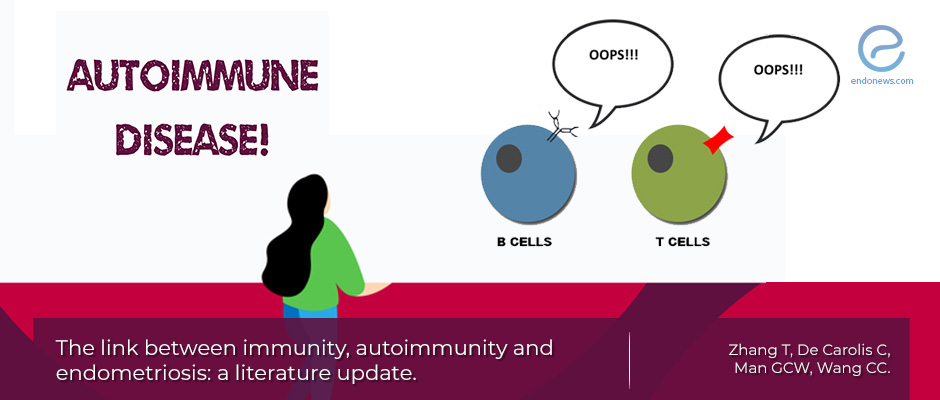The link between autoimmunity and endometriosis
Jun 26, 2019
When the immune system makes mistakes
Key Points
Highlight:
- The evidence on the autoimmune basis of endometriosis is limited, thus the autoimmune etiology of endometriosis remains controversial.
Importance:
- Understanding the link between autoimmunity and endometriosis will help to develop future immunomodulatory therapy for treating endometriosis.
What's done here:
- This is a review article discussing current understanding and up-to-date research findings of immunity and autoimmunity aspects of endometriosis.
Data:
- Endometriosis is associated with a chronic local inflammation and the presence of auto-antibodies.
- It may co-occur with a number of autoimmune diseases.
- A number of autoantibodies have been characterized as potential markers for assessing endometriosis and may also relate to infertility.
- Immunomodulatory therapy for autoimmune diseases may serve as a new therapeutic avenue for endometriosis treatment.
Lay Summary
A popular model to explain the etiology of endometriosis is Sampson’s theory of retrograde menstruation. In this model, the viable endometrial tissue is spread and attached to the peritoneal cavity through the fallopian tubes during menstruation, resulting in an inflammatory response. However, this theory does not fully explain the condition because not all women with reflux menstruation have endometriosis.
Another theory to complement the retrograde menstruation is the autoimmunity theory, which suggests that endometriosis is associated with a chronic local inflammation and the presence of auto-antibodies. These are actually the characteristics of autoimmune diseases.
It has been well established that endometriosis is an inflammatory disease. The aberrant increase of inflammatory cytokines and the involvement of peritoneal immune cells, especially macrophages, were shown to be critical to the pathogenesis of endometriosis.
In this review article, Zhang et al. from Department of Obstetrics and Gynaecology, The Chinese University of Hong Kong, Prince of Wales Hospital, Hong Kong aimed to connect the pieces of evidence that link the autoimmune dysfunction with endometriosis.
The reason for the elevated of auto-antibodies in women with endometriosis is unclear. Studies have suggested the co-morbidity of endometriosis with a number of autoimmune disorders, i.e., alopecia universalis, autoimmune thyroiditis, multiple sclerosis, autoimmune progesterone dermatitis, and Graves disease.
The article is published in the journal "Autoimmunity Reviews".
A number of anti-endometrial auto-antibodies which are better studied have been characterized as a potential diagnostic/follow-up marker for assessing endometriosis. These antibodies include transferrin and alpha 2 Heremans Schmidt (α2-HS) glycoprotein. For example, the levels of transferrin α2-HS glycoprotein in the peritoneal fluid of women with endometriosis are significantly elevated than controls. In addition, a number of other autoantibodies have also been found, including in infertile women with endometriosis undergoing assisted reproduction, where the pregnancy rates of the autoantibody-positive group were reduced, and can be improved by administration of a corticosteroid.
Hence, a number of immunological factors encompassing chronic local inflammation and autoantibodies can contribute significantly to the pathogenesis of endometriosis. Based on this evidence, autoantibodies could be a potential marker in women with endometriosis, as well as those associated with infertility.
The presence of autoimmunity in endometriosis also suggest that immunomodulatory therapy for autoimmune diseases may serve as a new therapeutic avenue for endometriosis, on top of current hormonal and surgical therapies, added the authors.
Research Source: https://www.ncbi.nlm.nih.gov/pubmed/30107265
immunity Graves Multipple sclerosis autoimmune thyroiditis progesterone auto-antibody therapy

